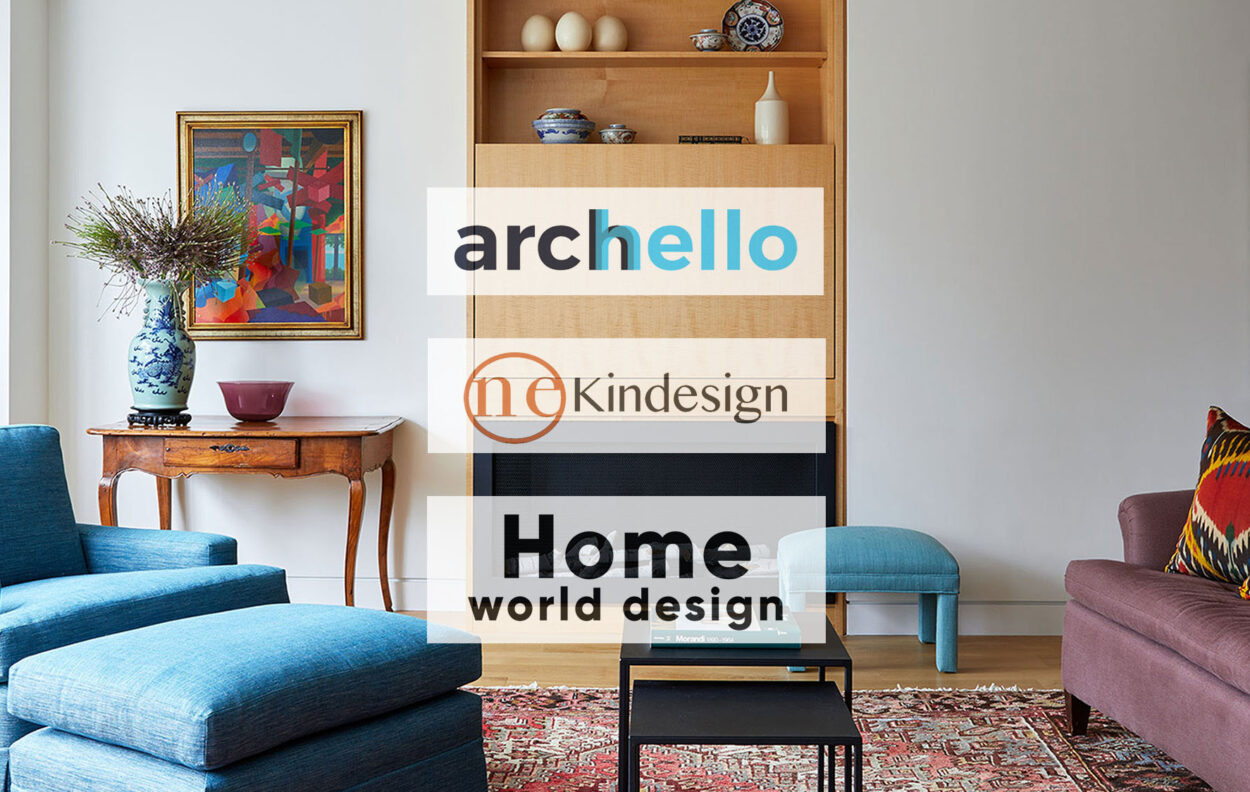Three online publications – Archello, One Kindesign and Home World Design – celebrate the completion of our Lincoln Towers Combination. Click on the individual links to see their full articles.
From One Kindesign: Studio ST Architects collaborated with Maggie Rosenblatt Design to renovate a post-war home for a recently married couple, located in the Upper West Side neighborhood in New York City, New York. Each had separate homes filled with lifelong possession and different aesthetic styles.
The design challenge was to create their first home together within a large post-war co-op building on the Upper West Side of Manhattan. The newly renovated space transforms three apartments (two that were previously combined, and an adjacent studio) into a spacious, light-filled modern apartment.
The new space uses a natural, muted, palette including green, off-white, pale yellow, and taupe, which form a clean backdrop for the owner’s eclectic and stylish collection of vintage furniture and modern art. Featured works include Gustavo Ojeda‘s “Midtown Manhattan”, Christopher Dunlap, Richard Toglia’s “Looking Out”, and Theresa Hackett‘s “Aquatic Dance”.
Architect Esther Sperber, the founder of Studio ST Architects, gutted and joined two separate apartments in the post-war building, reimagining them into one open, spacious, light-filled, contemporary home. The resulting 3,500-square-foot, light-filled apartment provides a cohesive design that combines the downtown East Village artistic sensibility of one partner with the utilitarian taste of the other.
There is now a gracious new entry foyer and gallery, an expansive living room, a formal dining room, and a large eat-in kitchen, as well as a main bedroom suite plus three bedrooms, two bathrooms, and a laundry room. The newlyweds purchased the former adjacent studio apartment to serve as a separate office/retreat.
The architect suggested knocking the adjoining wall down and converting it into the spacious primary suite — the old galley kitchen became the primary bathroom and large walk-in closet. The new and spacious primary suite is a private haven for the couple and features a luxury en-suite bath with a marble soaking tub and countertop.
“The challenge of this project was to create a beautiful, comfortable, and spacious apartment that did not feel like it was a combination of separate units. We were able to eliminate the existing narrow and dark hallways to create a simple and clean circulation. At the heart of the apartment, we created a large foyer and gallery for art – that also provides easy access to the kitchen, dining room, primary suite, living room, and bedrooms,” says Esther Sperber, Studio ST Architects.
The living room is open and light-filled. An artisan-made oak bar with open brass branch detail allows the light to flood in while still providing some sense of separation. A matching oak-veneer built-in cabinet above a gel-burning fireplace creates a new focal point for the living room.
The generously proportioned L-shaped kitchen in a muted white oak cabinetry replaced a narrow galley kitchen. Pocket doors, echoing the brass, branch design of the bar, connect the kitchen to a more formal dining room, decorated with modern art.
Designer Maggie Rosenblatt kept much of the homeowners antique and vintage furniture pieces but reupholstered them with pops of color for a fresh, contemporary design. She used Henry Calvin, Jim Thompson, and Mark Alexander fabrics.
“It was so delightful to help our clients express themselves and explore how to curate a cohesive delivery of their eclectic styles. I encouraged them to make some bold decisions such as having a modern kitchen with different finishes to offset the more traditional pieces. They also took a creative leap with a highly decorative, wilder style bathroom with feminine colors to counterbalance the more industrial, large art pieces. The mixing-up of styles has been a huge part of bringing their lifetimes’ worth of beloved objects into a shared space,” says interior designer Maggie Rosenblatt.
The couple is thrilled with the results, particularly the creative solutions and ingenious adaptations to structural challenges within the coop building. This includes working around structural columns to create closets and installing the ventless fireplace where pipes could not be moved.
The apartment feels like a home which is also an art gallery with museum-grade track lighting illuminating the showpieces. The result is a cohesive, open, and flowing space, with artistic elements that punctuate and define the spaces.
“Most of the artworks I collected were from the mid-’80s, East Village art scene,” says the homeowner. “The East Village art galleries featured a very diverse collection of artists and styles at that time. Many of the pieces collected were mainly semi-abstract oil and acrylic paintings, and some 3-D art. We like mixing contemporary art with country French and English antiques. The country French furniture — like the cherry dining room table and chairs and the cane armchairs — were collected mainly through the antique shops that used to prevail in the northwest end of Bleecker Street in the West Village. We are thrilled how it all came together so perfectly!”

